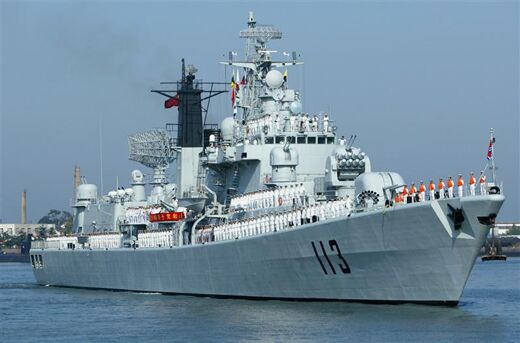
Chinese Call for Powerful Navy
The Chinese dragon is preparing to expand its navy and, it appears, to fight a war.
Chinese President Hu Jintao has called on China to build a powerful navy to undergird its growing regional and international clout. Speaking at a Communist Party meeting of the Navy on December 27, Jintao said the Navy must be combat-ready and able to meet the “historical mission in this new century and at this new stage.”
Reuters reported December 28, “China’s naval expansion includes a growing submarine fleet and new ships with ‘blue water’ capability, fueling fears in the United States that its military could alter the balance of power in Asia with consequences for Taiwan.”
President Hu said, “We should make sound preparations for military struggles and ensure that the forces can effectively carry out missions at any time.”
There are two prevailing issues for which Hu could be gearing up the Navy. The first is his nation’s over-reliance on oil imports.
According to the Energy Information Administration (eia), which keeps track of official energy statistics for the U.S. government, China was expected to account for 38 percent of world oil demand increase in 2006; currently, China’s demand is second only to the United States. To ensure that safe transport of this economic lifeblood continues, China has secured trading routes and access to ports from the Middle East and around the world. To protect these trade routes, China needs a combat-ready navy.
The second military struggle, and “historical mission” Jintao could be referring to, is the conquest of Taiwan.
China views Taiwan as a renegade Chinese territory. Beijing has threatened to use force against Taiwan if it formally declares independence, and appears to be developing the muscle to back the words up. Any designs on Taiwan would have to include preparing for the possible involvement of the United States, which has stated it would defend Taiwan from any Chinese aggression. Again, to conquer Taiwan would require a powerful, combat-ready navy.
A report prepared for the U.S. government by the United States Congressional Research Service notes, “Observers believe a near-term focus of China’s military modernization is to field a force that can succeed in a short-duration conflict with Taiwan and act as an anti-access force to deter U.S. intervention or delay the arrival of U.S. forces, particularly naval and air forces, in such a conflict. Some analysts speculate that China may attain (or believe that it has attained) a capable maritime anti-access force, or elements of it, by about 2010. Other observers believe this will happen later. Potential broader or longer-term goals of China’s naval modernization include asserting China’s regional military leadership and protecting China’s maritime territorial, economic and energy interests.”
However, China’s building a powerful combat-ready navy will not come without regional consequences.
How China’s modernization will impact its most powerful regional neighbor, Japan, remains to be seen. Many in Japan still view China as an enemy. The Associated Press recently wrote, “Japan’s Defense Agency lists China’s military expansion as a top security concern in the region. Chinese defense spending has jumped by double-digit percentages since the early 1990s, and Japanese Foreign Minister Taro Aso has repeatedly called China a threat—drawing angry protests from Beijing.”
Historically, and to date, Japan has retained Asia’s most formidable navy for the same reasons China wishes to build its own: regional supremacy, dependence on mercantile trade, and importing oil to sustain its economy. For its part, Japan has little to no domestic oil or natural gas reserves, and according to the eia, in 2005 it was the second-largest net importer of crude oil in the world and third-largest oil consumer, behind the United States and China.
While it might be expected that Japan would view China’s naval build-up as a regional threat to its own naval supremacy, recent cooperation between the two countries demonstrates their growing mutual willingness to bury old hatchets and start fresh. In his New Year’s statement, Japanese Prime Minister Shinzo Abe stated, “I have agreed with China to bolster already cordial ties into a mutually beneficial, strategic relationship. … I plan to build forward-looking relations based on trust.” Abe has made Sino-Japanese relations a major priority since taking office.
Yet, while speaking of the prevailing goodwill between China and Japan, Abe also struck a more somber chord, calling for changes to Japan’s constitution, “and hailed the impending upgrade of the country’s Defense Agency to a full ministry—moves that have been criticized as shifting the country away from its postwar pacifism.” Several recent reports show that Japan is looking for a return to greater military capabilities.
While historically China and Japan have turned their arms against each other, the Bible plainly speaks about Asia, with Russia and China in particular, forming a major power bloc. This strategic alliance is forecasted to produce a massive standing army—which signals that an unprecedented military build-up is about to begin within Russia and Asia.
To fully understand why this military build-up is occurring and where it is leading, read our free booklet Russia and China in Prophecy.
